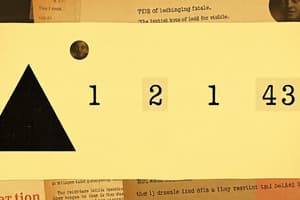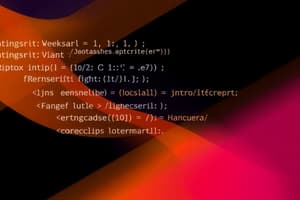Podcast
Questions and Answers
What is the difference between a character array and a string in C?
What is the difference between a character array and a string in C?
- A character array is represented by sequences of characters between double quotes, while a string is not.
- A character array is enclosed in double quotes, while a string is not.
- A character array is terminated with a null character, while a string is not terminated. (correct)
- A character array can only store single character values, while a string can store multiple characters.
How are string literal values represented in C?
How are string literal values represented in C?
- As a sequence of characters enclosed in single quotes.
- As a sequence of characters enclosed in angle brackets.
- As a sequence of characters enclosed in double quotes. (correct)
- As a sequence of characters separated by commas.
What happens when the compiler encounters a sequence of characters enclosed in double quotes in C?
What happens when the compiler encounters a sequence of characters enclosed in double quotes in C?
- It removes the null character from the end of the sequence.
- It appends a null character at the beginning of the sequence.
- It appends a null character at the end of the sequence. (correct)
- It removes the double quotes and replaces them with single quotes.
How is a string declared in C?
How is a string declared in C?
What is the purpose of the null character ('\0') in C strings?
What is the purpose of the null character ('\0') in C strings?
Flashcards are hidden until you start studying
Study Notes
Character Array vs String in C
- A character array is a collection of characters stored in contiguous memory locations, whereas a string is a character array that is terminated by a null character ('\0').
- A string is a special type of character array that is used to represent a sequence of characters.
String Literal Representation in C
- String literal values are represented in C as an array of characters, with each character stored in a single byte.
- The string literal is stored in the read-only memory area of the program.
Compiler's Handling of Double Quotes
- When the compiler encounters a sequence of characters enclosed in double quotes, it treats it as a string literal and stores it in memory.
- The compiler automatically appends a null character ('\0') to the end of the string literal.
Declaring a String in C
- A string can be declared in C using a character array, such as
char str[10];. - The size of the array should be large enough to hold the string, including the null character.
Purpose of the Null Character ('\0')
- The null character ('\0') is used to mark the end of a string in C.
- It is used by string functions to determine the length of the string.
- It is automatically appended to the end of a string literal by the compiler.
Studying That Suits You
Use AI to generate personalized quizzes and flashcards to suit your learning preferences.




